| Go to Overview Page. | File Modified: 2012-11-24 |
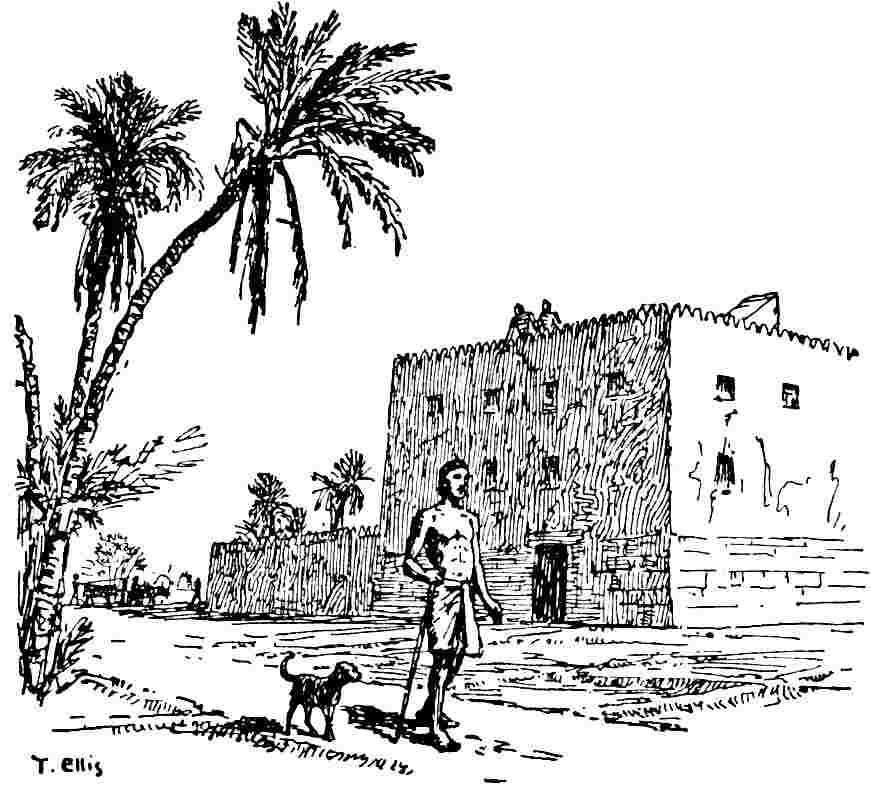
There once was a king to whom no son was born; and his heart was grieved, and he prayed for himself unto the gods around him for a child. They decreed that one should be born to him. And his wife, after her time was fulfilled, brought forth a son. Then came the Hathors to decree for him a destiny; they said, "His death is to be by the crocodile, or by the serpent, or by the dog." Then the people who stood by heard this, and they went to tell it to his majesty. Then his majesty's heart sickened very greatly. And his majesty caused a house to be built upon the desert; it was furnished with people and with all good things of the royal house, that the child should not go abroad. And when the child was grown, he went up upon the roof, and he saw a dog; it was following a man who was walking on the road. He spoke to his page, who was with him, "What is this that walks behind the man who is coming along the road?" He answered him, "This is a dog." The child said to him, "Let there be brought to me one like it." The page went to repeat it to his majesty. And his majesty said, "Let there be brought to him a little pet dog, lest his heart be sad." And behold they brought to him the dog.
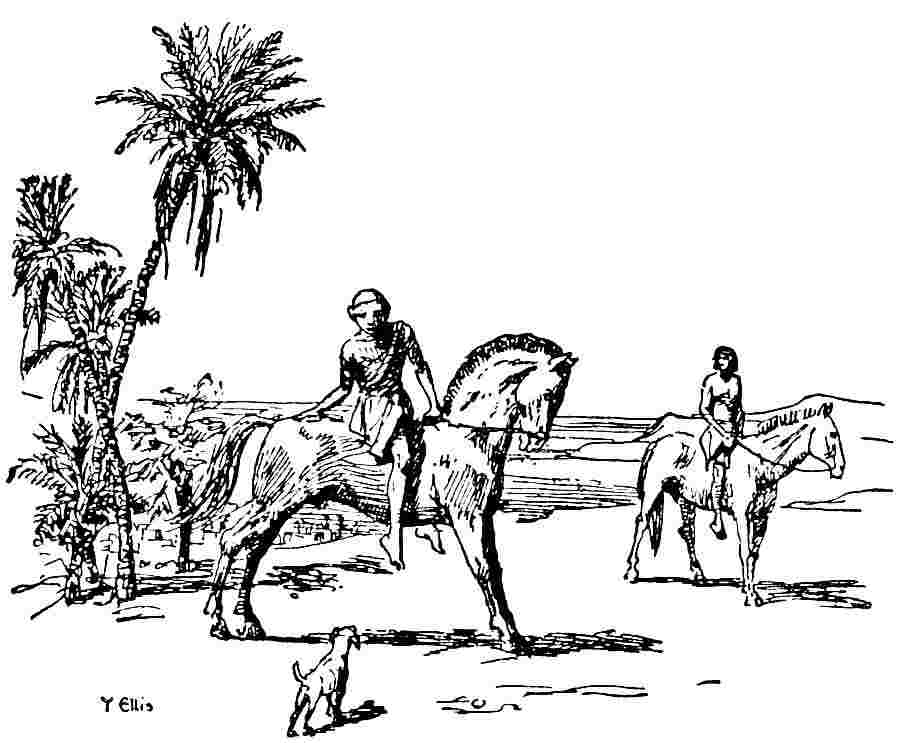
Then when the days increased after this, and when the child became grown in all his limbs, he sent a message to his father saying, "Come, wherefore am I kept here? Inasmuch as I am fated to three evil fates, let me follow my desire. Let God do what is in His heart." They agreed to all he said, and gave him all sorts of arms, and also his dog to follow him, and they took him to the east country, and said to him, "Behold, go thou whither thou wilt." His dog was with him, and he went northward, following his heart in the desert, while he lived on all the best of the game of the desert. He went to the chief of Naha-raina.
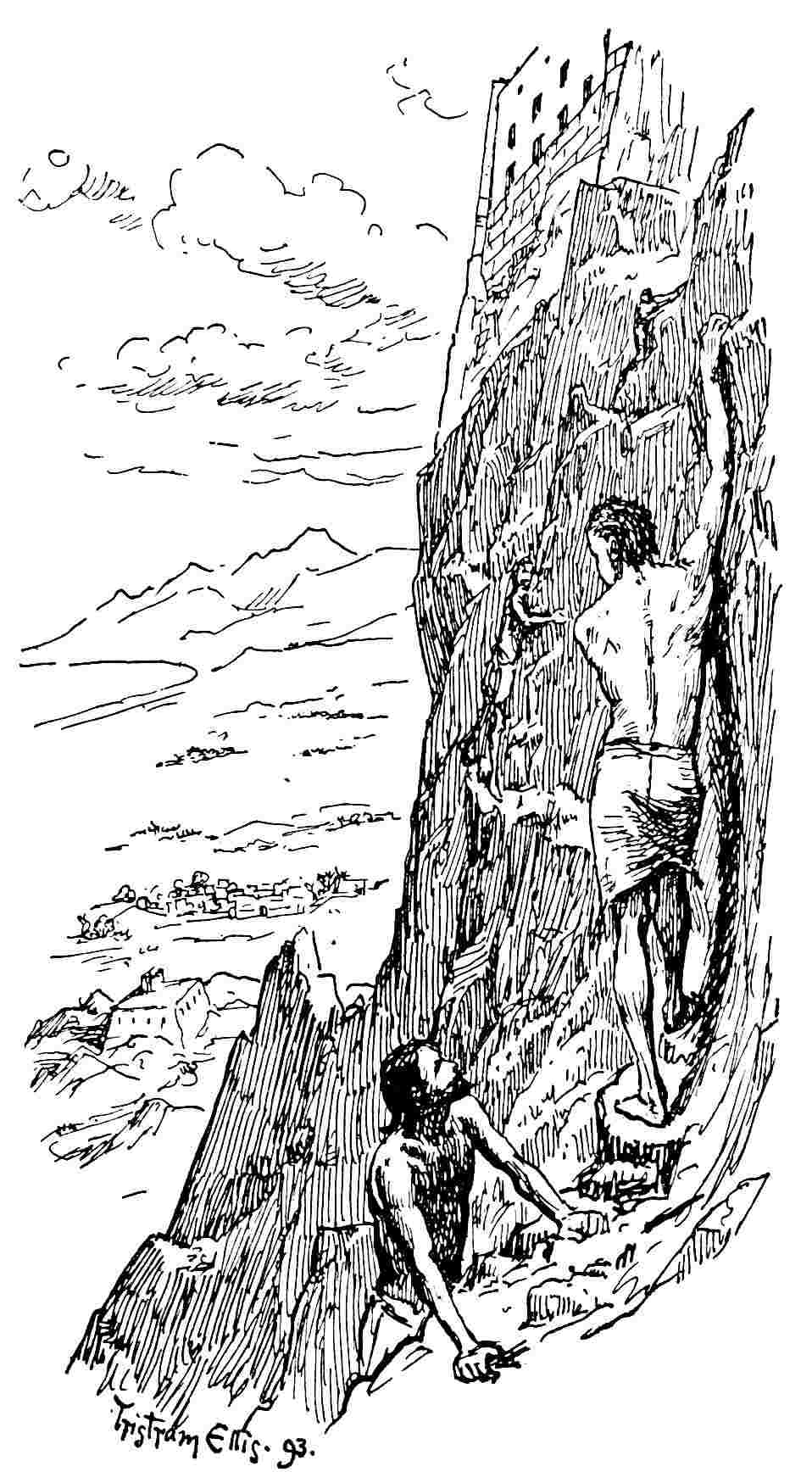
And behold there had not been any born to the chief of Naharaina, except one daughter. Behold, there had been built for her a house; its seventy windows were seventy cubits from the ground. And the chief caused to be brought all the sons of the chiefs of the land of Khalu, and said to them, "He who reaches the window of my daughter, she shall be to him for a wife."
And many days after these things, as they were in their daily task, the youth rode by the place where they were. They took the youth to their house, they bathed him, they gave provender to his horses, they brought all kinds of things for the youth, they perfumed him, they anointed his feet, they gave him portions of their own food; and they spake to him, "Whence comest thou, goodly youth?" He said to them, "I am son of an officer of the land of Egypt; my mother is dead, and my father has taken another wife. And when she bore children, she grew to hate me, and I have come as a fugitive from before her." And they embraced him, and kissed him.
And after many days were passed, he said to the youths, "What is it that ye do here?" And they said to him, "We spend our time in this: we climb up, and he who shall reach the window of the daughter of the chief of Naharaina, to him will he given her to wife." He said to them, "If it please you, let me behold the matter, that I may come to climb with you." They went to climb, as was their daily wont: and the youth stood afar off to behold; and the face of the daughter of the chief of Naharaina was turned to them. And another day the sons came to climb, and the youth came to climb with the sons of the chiefs. He climbed, and he reached the window of the daughter of the chief of Naharaina. She kissed him, she embraced him in all his limbs.
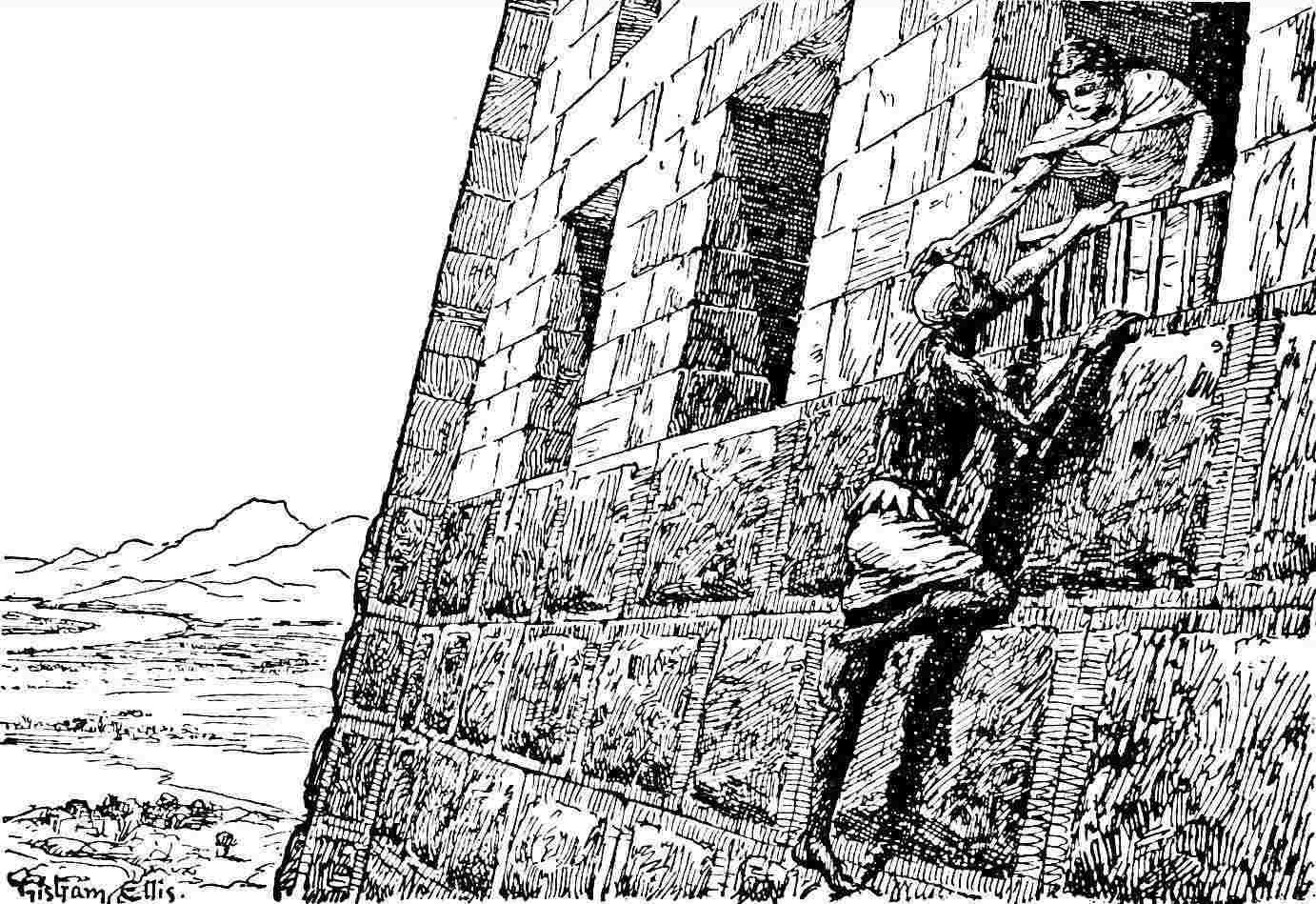
And one went to rejoice the heart of her father, and said to him, "One of the people has reached the window of thy daughter." And the prince inquired of the messenger, saying, "The son of which of the princes is it?" And he replied to him, "It is the son of an officer, who has come as a fugitive from the land of Egypt, fleeing from before his stepmother when she had children." Then the chief of Naharaina was exceeding angry; and he said, "Shall I indeed give my daughter to the Egyptian fugitive? Let him go back whence he came." And one came to tell the youth, "Go back to the place thou earnest from." But the maiden seized his hand; she swore an oath by God, saying, "By the being of Ra Harakhti, if one takes him from me, I will not eat, I will not drink, I shall die in that same hour." The messenger went to tell unto her father all that she said. Then the prince sent men to slay the youth, while he was in his house. But the maiden said, "By the being of Ra, if one slay him I shall be dead ere the sun goeth down. I will not pass an hour of life if I am parted from him." And one went to tell her father. Then the prince made them bring the youth with the maiden. The youth was seized with fear when he came before the prince. But he embraced him, he kissed him all over, and said, "Oh! tell me who thou art; behold, thou art to me as a son." He said to him, "I am a son of an officer of the land of Egypt; my mother died, my father took to him a second wife; she came to hate me, and I fled a fugitive from before her." He then gave to him his daughter to wife; he gave also to him a house, and serfs, and fields, also cattle and all manner of good things.
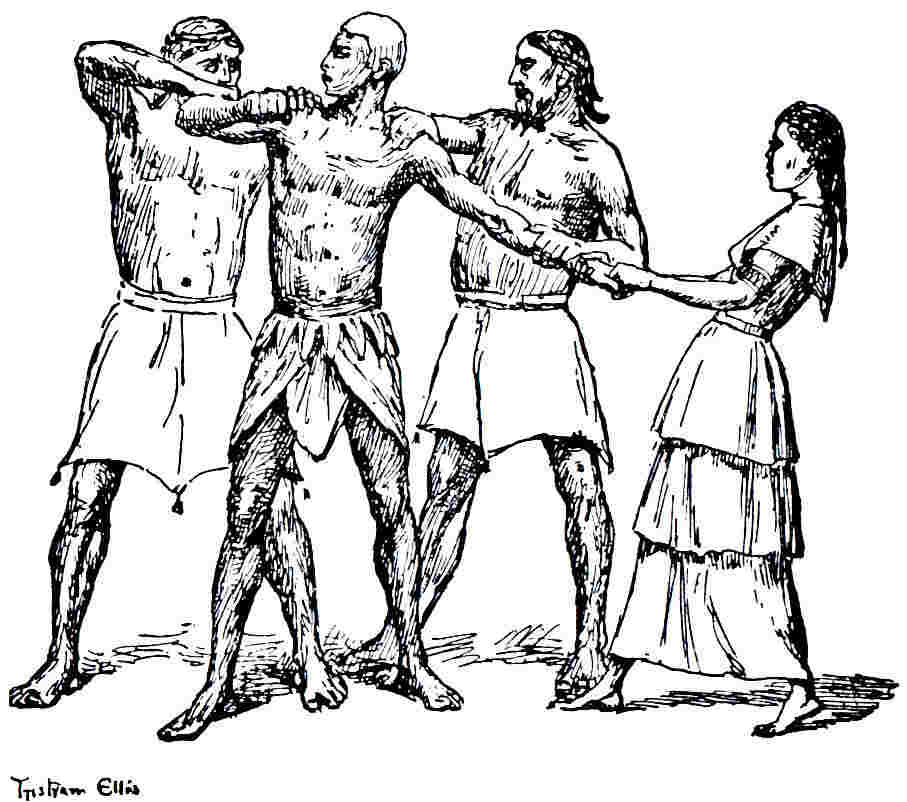
But after the days of these things were passed, the youth said to his wife, "I am doomed to three fates—a crocodile, a serpent, and a dog." She said to him, "Let one kill the dog which belongs to thee." He replied to her, "I am not going to kill my dog, which I have brought up from when it was small." And she feared greatly for her husband, and would not let him go alone abroad.
And one went with the youth toward the land of Egypt, to travel in that country. Behold the crocodile of the river, he came out by the town in which the youth was. And in that town was a mighty man. And the mighty man would not suffer the crocodile to escape. And when the crocodile was bound, the mighty man went out and walked abroad. And when the sun rose the mighty man went back to the house; and he did so every day, during two months of days.
Now when the days passed after this, the youth sat making a good day in his house.
And when the evening came he lay down on his bed, sleep seized upon his limbs; and his wife filled a bowl of milk, and placed it by his side. Then came out a serpent from his hole, to bite the youth; behold his wife was sitting by him, she lay not down. Thereupon the servants gave milk to the serpent, and he drank, and was drunk, and lay upside down. Then his wife made it to perish with the blows of her dagger. And they woke her husband, who was astonished; and she said unto him, "Behold thy God has given one of thy dooms into thy hand; He will also give thee the others." And he sacrificed to God, adoring Him, and praising His spirits from day to day.
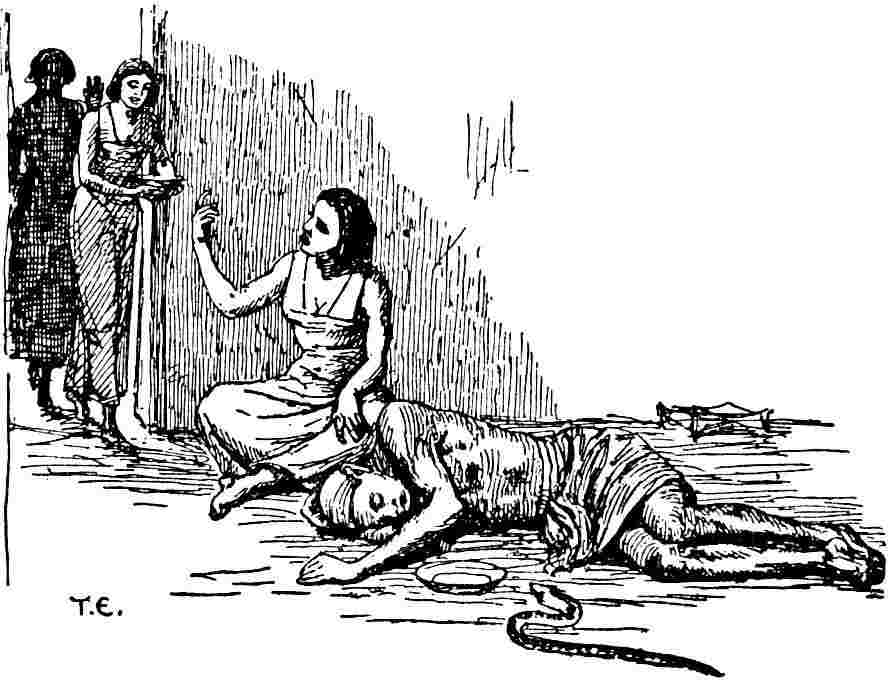
And when the days were passed after these things, the youth went to walk in the fields of his domain. He went not alone, behold his dog was following him. And his dog ran aside after the wild game, and he followed the dog. He came to the river, and entered the river behind his dog. Then came out the crocodile, and took him to the place where the mighty man was. And the crocodile said to the youth, "I am thy doom, following after thee. …"
[Here the papyrus breaks off.]
This tale is preserved in one of the Harris papyri (No. 500) in the
British Museum. It has been translated by Goodwin, Chabas, Maspero, and
Ebers. The present version is adapted from that of Maspero, with
frequent reference by Mr. Griffith to the original.
The marvellous parentage of a fated or gifted hero is familiar in Eastern tales, and he is often described as a divine reward to a long-childless king. This element of fate or destiny is, however, not seen before this age in Egyptian ideas; nor, indeed, would it seem at all in place with the simple, easygoing, joyous life of the early days. It belongs to an age when ideals possess the mind, when man struggles against his circumstances, when he wills to be different from what he is. Dedi or the shipwrecked sailor think nothing about fate, but live day by day as life comes to them. There is here, then, a new element, that of striving and of unrest, quite foreign to the old Egyptian mind. The age of this tale is shown plainly in the incidents. The prince goes to the chief of Naharaina, a land probably unknown to the Egyptians until the Asiatic conquests of the XVIIIth Dynasty had led them to the upper waters of the Euphrates. In earlier days Sanehat fled to the frontier at the Wady Tumilat, and was quite lost to Egypt when he settled in the south of Palestine. But when the Doomed Prince goes out of Egypt he goes to the chief of Naharaina, as the frontier State. This stamps the tale as subsequent to the wars of the Tahutimes family, and reflects rather the peaceful intercourse of the great monarch Amenhotep the Third. If it belonged to the Ramessides we should not hear of Naharaina, which was quite lost to them, but rather of Dapur (Tabor) and Kadesh, and of the Hittites as the familiar frontier power.
The Hathors here appear as the Fates, instead of the goddesses Isis, Nebhat, Mes-khent, and Hakt, of the old tale in the IVth Dynasty (see first series, p. 33); and we find in the next tale of Anpu and Bata, in the XIXth Dynasty, that the seven Hathors decree the fate of the wife of Bata. That Hathor should be a name given to seven deities is not strange when we see that Hathor was a generic name for a goddess. There was the Hathor of foreign lands, such as Punt or Sinai; there was the Hathor of home towns, as Dendera or Atfih; and Hathor was as widely known, and yet as local, as the Madonna. In short, to one of the races which composed the Egyptian people Hathor was the term for any goddess, or for a universal goddess to whom all others were assimilated. Why and how this title "house of Horus" should be so general is not obvious.
The variety of fate here predicted is like the vagueness of the fate of Bata's wife, by "a sharp death." It points to the Hathors predicting as seers, rather than to their having the control of the future. It bears the stamp of the oracle of Delphi, rather than that of a divine decree. In this these goddesses differ greatly from the Parcae, whose ordinances not even Zeus could withstand, as Lucian lets us know in one of the most audacious and philosophical of the dialogues. The Hathors seem rather to deal with what we should call luck than with fate: they see the nature of the close of life from its beginning, without either knowing or controlling its details.
In this tale we meet for the first time the idea of inaccessible and mysterious buildings; and from the resort to this element or curiosity in describing both the prince and the princess, it appears as if it were then a new motive in story-telling, and had not lost its power. To modern ears it is, of course, done to death since the "Castle of Otranto"; though as a minor element it can still be gently used by the poet and novelist in a moated grange, a house in a marsh or a maze. Another point of wonder, so well known in later times, is the large and mystic number of windows, like the 365 windows attributed to great buildings of the present age. It would not be difficult from these papyrus tales to start an historical dictionary of the elements of fiction: a kind of analysis that should be the death of much of the venerable stock-in-trade.
We see coming in here, more strongly than before, the use of emotions and the force of character. The generous friendship of the sons of the Syrian chiefs; then the burst of passionate love from the chiefs daughter, which saves the prince's life twice over from her father, and guards him afterwards from his fates; again, the devotion of the prince to his favourite dog, in spite of all warnings—these show a reliance on personal emotion and feeling in creating the interest of the tale, quite different from the mere interest of incident which was employed earlier. The reason which the prince alleges for his leaving Egypt is also a touch of nature, the wish of a mother to oust her stepson in order to make way for her own children, one of the deepest and most elemental feelings of feminine nature.
The mighty man and the crocodile are difficult to understand, the more so as the tale breaks off in the midst of that part. It appears also as if there had been some inversion of the paragraphs; for, first, we read that the wife would not let the prince go alone, and one goes with him toward Egypt, and the crocodile of the Nile (apparently) is mentioned; then he is said to be sitting in his house with his wife; then he goes in the fields of his domain and meets the crocodile. It may be that a passage has dropped out, describing his wife's accompanying him to settle in Egypt. But the mighty man—that is another puzzle. He binds a crocodile, and goes out while he is bound, but by night. The point of this is not clear. It may have been, however, that the mighty man went back to the house when the sun was high, that he might not lose his shadow. In Arabia there was a belief that a hyasna could deprive a man of speech and motion by stepping on his shadow—analogous to the belief in many other lands of the importance of preserving the shadow, and avoiding the shadowless hour of high noon (Frazer, "Golden Bough," p. 143). Hence the strength of the mighty man, and his magic power over the crocodile, would perhaps depend on his not allowing his shadow to disappear. And though Egypt is not quite tropical, yet shadows do practically vanish in the summer, the shadow of the thin branches of a tall palm appearing to radiate round its root without the stem casting any shade.
The use of milk to entice serpents is still well known in Egypt; and when a serpent appeared in some of my excavations in a pit, the men proposed to me to let down a saucer of milk to entice it out, that they might kill it.
The close of the tale would have explained much that is now lost to us. The crocodile boasts of being the fate of the prince; but his dog is with him, and one can hardly doubt that the dog attacks the crocodile. There is also the mighty man to come in and manage the crocodile. Then the dog is left to bring about the catastrophe. Or does the faithful wife rescue him from all the fates? Hardly so, as the prediction of the Hathors comes strictly to pass in the tale of Anpu and Bata. Let us hope that another copy may be found to give us the clue to the working of the Egyptian mind in this situation.